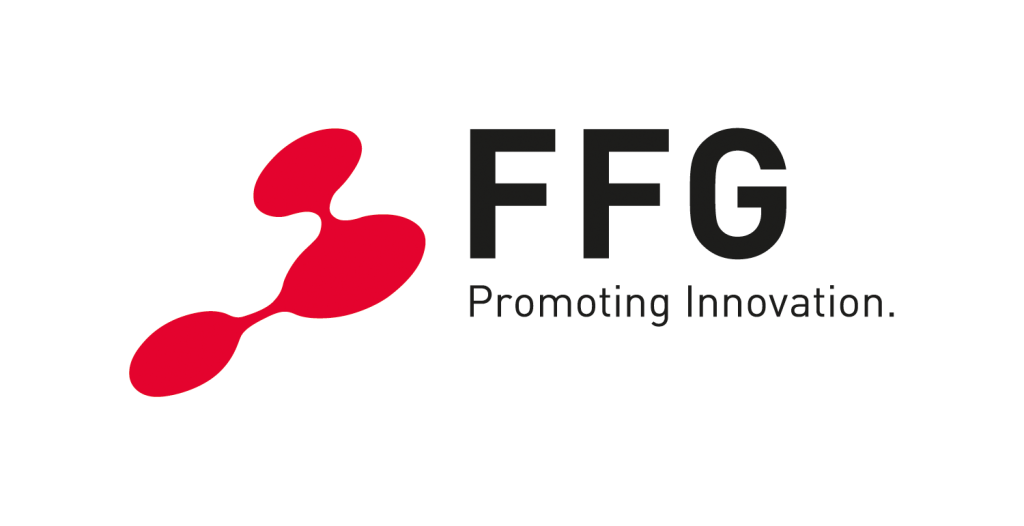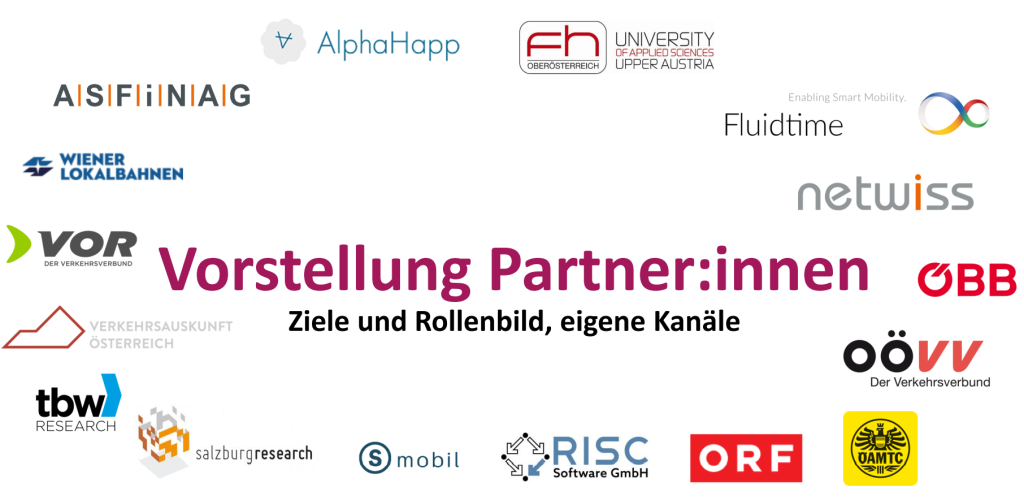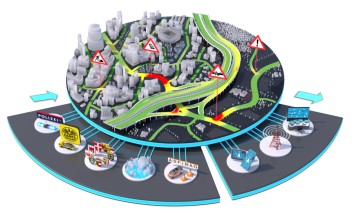Project MUST
The main objectives of the MUST project are to directly and indirectly influence mobility behavior in terms of climate and environmentally friendly traffic management through traffic avoidance, modal shift and traffic improvement. For example, the aim is to test which combinations of information can be used to transport traffic information across target groups in order to achieve positive effects.
In Austria, traffic information on the radio, via roadside displays, apps, etc., with information on current traffic events and, for some years now, with the multimodal route planner of VAO (Verkehrsauskunft Österreich), provides a broad information base. The MUST project lays the foundation for future intermodal and holistic traffic management with coordinated information that includes the broad know-how of the operators of transport routes and means of transport and the current situations on their networks and in their means of transport. In recent years
transport modes have been combined with each other, particularly for route planning. Services such as ÖBB Scotty, AnachB, Smartride, Wegfinder or Wien Mobil already offer relevant information from MIT, public transport, cycling and walking as well as combinations such as park & ride routes or routing with sharing options (rental bikes, scooters, etc.).
(rental bikes, scooters, etc.).
In MUST, which is a follow-up project to DOMINO (www.domino-ooe.at), new information channels are being developed (e.g. monitors for carpooling information, Outlook add-in for planning shared commutes) and existing channels improved (usability, app functions, reward system, communication content, etc.) and expanded (e.g. linking existing Austrian carpooling platforms with VAO).
and expanded (e.g. networking existing Austrian carpooling platforms with VAO) Media partnerships during the course of the project should help to create reach and receive feedback from users very quickly. The main objectives of the project are to directly and indirectly influence mobility behavior in terms of climate and environmentally friendly traffic management through traffic avoidance, modal shift and traffic improvement. For example, it will be tested which combinations of information can be used to transport traffic information across target groups in order to achieve positive effects.
Mit Testkorridoren wird die Wirksamkeit von im Projektkonsortium vorhandenen (neuen) Informations- und Kommunikationskanälen anhand von Piloten getestet. Diese Korridore sind im Flachgau (A1, B1, Westbahn), im Pongau (A10, B159, Giselabahn), im Mühlviertel (A7, S10, B3, B125, B127, Mühlkreisbahn) und im Industrieviertel (A2/
A23, B17, Badner Bahn, Südbahn). Die Ergebnisse und Resultate werden als Grundlage für Evaluierung und Optimierungen bei der kooperativen Erstellung und Distribution von Mobilitätsinformationen herangezogen und dienen als Basis zur Weiterentwicklung und Verbesserung bestehender, produktiver oder noch zu konzeptionierenden Kanäle bzw. Serviceleistungen.
The role of RISC Software GmbH
The main task of RISC Software GmbH in the Upper Austrian pilot project MUST is to analyze the impact of the entire information chain.
In order to evaluate the influence of various information channels on the usage behavior of road users, the access figures to public transport information services are to be tracked and their influence on the behavior of road users, such as the counting points of the province of Upper Austria & ASFINAG and the usage data of the Domino carpooling app, are to be evaluated. Weather data is also included in the assessment of user behavior. The data is delivered via various protocols in different formats and must be cleansed in order to effectively support the further evaluation of the data, for which a data model adapted to the planned queries is being designed. Due to the expected increase in data volumes as a result of the ongoing collection of different channels, a further focus is on short response times and the scalability of the system.
Based on the processed and linked data, the first step is to analyze the actual state of historical usage behavior in the available data period and examine it for stationarity or long-term trends, seasonal movements and short-term fluctuations.
In order to be able to make statements about the impact of the information channels, selected reference circuits and the actual usage figures are to be evaluated for different impact periods. Depending on the findings collected from the database, various methods from the field of time series analysis will be evaluated, including correlation analyses, hypothesis tests and determination of statistical significance, investigations into a cause-and-effect relationship (causality) or methods from the field of change point detection for the detection of abrupt changes, e.g. based on statistical characteristics such as mean value or variance, but also changes in patterns in multidimensional time series.
In iterative feedback loops, these effects are to be evaluated and validated in visual representations together with the domain experts.
RISC Software GmbH has built up a solid knowledge base in the field of intelligent transportation systems, big data engineering and data science in the Smart Mobility & Analytics department through the implementation of several extensive projects in the research and commercial environment.
Results of the partner from other projects:
- EVIS / ITS Upper Austria: In the ITS Upper Austria project, a traffic situation system was set up for the Upper Austria region, which uses information from floating car data, permanent counting stations, Bluetooth and a traffic simulation to generate detailed travel times, short-term and long-term forecasts. This information comes together in the data collection and distribution system of the national EVIS project, which takes care of the harmonization and qualitative improvement of the traffic situation images of the participating road operators in Austria.
- LisiGoesDigital (FFG No. 862020): In LisiGo, an app was implemented which, based on EVIS, provides a traffic information system for commuters within the city of Linz. For their own daily commuter route, all relevant information is extracted from various information channels, such as multimodal route information including carpooling offers from Domino, text-based travel information from Life Radio including podcast, traffic information from EVIS and traffic cameras from Asfinag, in order to provide users with a clear overview of the current traffic situation.
- OÖ SmartDriveBase 2 (GVOEV-2021-431155/2-ERM) is a service project with the state of Upper Austria, in which information from Domino (public transport offers, ride-sharing) can be integrated into existing apps and websites with the help of an info channel plugin. The plugins have already been integrated into the Upper Austrian transport information app LisiGo, the website of OÖ Nachrichten and the province of Upper Austria.
- RISC prepares weather data and forecasts for the company MOWIS in order to fill various information channels. The use of this data is contractually agreed for research projects.

Project partners
The project consortium consists of ASFINAG, ÖBB, ORF, VAO, VOR Verkehrsverbund Ost-Region, ÖAMTC, AlphaHapp GmbH, OÖ Verkehrsverbund, FH OÖ Forschungs-& Entwicklungs GmbH, Fluidtime Data Services GmbH, netwiss OG, tbw research, s.mobil, Salzburg Research, RISC Software GmbH and Wiener Lokalbahnen. Many high-reach information channels are located in the direct sphere of influence of this consortium – thus ensuring efficient and targeted processing of the project content and an effective pilot phase in the project.
This project is funded by the Austrian Research Promotion Agency (FFG) under project no. 902291.

Project partners

Project Details
- Project Short Title: MUST
- Project Long Title: Multimodal Traffic Control through the Combination of Innovative Information Channels
- Project Partners:
- ASFINAG
- ÖBB
- ORF
- VAO
- VOR Traffic Association Eastern Region
- ÖAMTC
- AlphaHapp GmbH
- Upper Austria Transport Association
- FH Upper Austria Research & Development GmbH
- Fluidtime Data Services GmbH
- netwiss OG
- tbw research
- s.mobil
- Salzburg Research
- RISC Software GmbH
- Wiener Lokalbahnen.
- Call for Proposals: FFG Call “Mobility – Cities and Digitalization 2022”
- Total Budget Volume: 2.400 million EUR
- Duration: 10/ 2023 – 05/2026 (36 months)
Contact person
Project management

DI Paul Heinzlreiter
Senior Data Engineer

